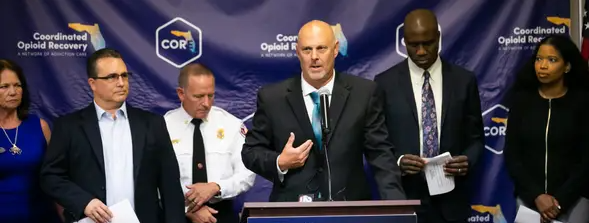It's a New Day in Public Health.
The Florida Department of Health works to protect, promote, and improve the health of all people in Florida through integrated state, county, and community efforts.
FDOH and DCF Leadership Visit Marion County Core Network
October 13, 2022

Deputy Secretary and Health Officer for Marion County addresses the audience. Photo credit: Ocala Star-Banner.
Contact:
Communications Office
NewsMedia@flhealth.gov
850-245-4111
Marion County, Fla. – Today, State Surgeon General Dr. Joseph Ladapo, Deputy Secretary for Health Dr. Kenneth Scheppke, and Florida Department of Children and Families Secretary Shevaun Harris, alongside community partners, visited the expansion of the Coordinated Opioid Recovery (CORE) in Marion County - a comprehensive network of addiction and opioid treatment.
This year, Florida has experienced over 4,000 reported fatal overdoses. In Marion County, Emergency Medical Services reported that in 2021, teams responded to over 3,000 overdose calls. Current data indicates Marion County is in the top 10 counties in Florida with the highest fatal overdose rates.
The CORE Network is the first of its kind in the nation, coordinated through the Florida Department of Health, Florida Department of Children and Families, and the Agency for Health Care Administration. The full-scale treatment approach of the CORE Network expands every aspect of overdose response and creates an all-inclusive sustained system of care and patient navigation to holistically address all primary and secondary impacts of substance use disorder.
“The existing standard of care for substance use disorder is outdated. The current overdose response in most of the United States treats the acute overdose, without providing access to sustainable care,” said Dr. Kenneth Scheppke, Deputy Secretary for Health. “That’s exactly why we’ve developed CORE. This program facilitates the necessary connections among local emergency response and specialty health care networks to not only respond to an acute overdose, but to connect individuals suffering from substance use disorder to sustainable and long-term care.”
In the wake of Hurricane Ian, there is also concern of increased substance use and overdose deaths due to the impact on individuals’ mental health and the disruption of normal pharmaceutical supply chains. It is critical that community partners provide resources to their communities as we recover from the effects of Hurricane Ian’s devastation. We must remain vigilant both now and in the long-term to prevent overdose deaths.
“We are grateful for the leadership of Governor DeSantis in championing the development of the CORe Network - a comprehensive model of care in addressing the opioid epidemic,” said Department of Children and Families Secretary Shevaun Harris. “We must break down the traditional siloed approach and episodic treatment of this disease if we want to break the cycle of addiction. Partnership and collaboration are key to the success of this approach, and we could not be prouder at DCF to be a part of this first-of-its kind model, along with the Department of Health and so many other community partners.”
Substance abuse is a chronic multifaceted life-threatening disease. If an individual in Marion County overdoses, specialized emergency medical services protocol will begin stabilization while transporting the patient to a specialty hospital with attained specialty expertise in addiction medicine. Once all emergent health threats are stabilized, the patient’s long term care needs will then be transferred to an expert multi-specialty outpatient practice to support sustainable recovery.
CORE provides a personalized treatment umbrella ranging from primary care to mental health support. By facilitating these connections in Marion County, CORE disrupts the revolving door of addiction by connecting overdoses to sustainable care in real time.
If you, or someone you know, is struggling with substance use disorder and would like more information on CORE in Marion County, you may contact the Ocala Fire Rescue at 352-266-4769 or the Marion County Health Department.
If you suspect an overdose, call 911 immediately. The state of Florida has deployed resources that can be posted in public areas to ensure Floridians remain vigilant of the signs of overdose, how to respond, and where help is available.
About the CORE Network
CORE was successfully piloted in Palm Beach County for nearly two years and will be expanding in up to twelve additional counties to help patients break free from the deadly cycle of overdose. Floridians battling with addiction can utilize CORE for stabilization and to receive medication assisted treatment from a network of specialized medical experts that will help guide them on a sustained pathway to healthy success.
Florida is proud of its efforts in fighting the opioid epidemic and continues do so with access, evidence-based care, and lifelong comprehensive treatment. Information about CORE and various recovery resources.
About the Florida Department of Health
The department, nationally accredited by the Public Health Accreditation Board, works to protect, promote and improve the health of all people in Florida through integrated state, county and community efforts.
Follow us on Twitter at @HealthyFla and on Facebook. For more information about the Florida Department of Health please visit www.FloridaHealth.gov.
Subscribe To Email List



Connect with DOH